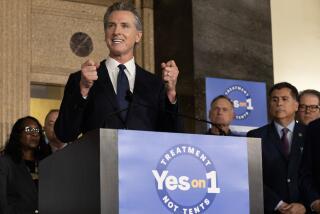To See the Future of American Politics, Look to Jesse Helms : Election: The mood of the voters is increasingly dark and angry. Jesse Helms reflects that. His time is not over, it might be just beginning.
- Share via
CHARLOTTE, N.C. — Politics is a blood sport, and no one practices it better than Jesse Helms. People who think Helms is a home-grown aberration from North Carolina, a sort of noxious political cousin to Jim and Tammy Faye Bakker, had better think again. Though he’s no George C. Wallace and has no aspirations for higher office, Helms represents a large and growing constituency with well-defined religious, social and economic values that extend far beyond the boundaries of the state where he just defeated Harvey Gantt, the Democrat’s brightest new hopeful.
Gantt went down to defeat not because he is black. Race hurt him in the end--but remember, it almost elected him, too. He lost because Helms is more in touch with what a majority of voters really want. The vision may not be pretty, but it’s the future of American politics. It is a dark, angry vision, but one that might be increasingly in tune with the public mood, if a recession sets in. National Democrats who want to move from the opposition into a majority role need to take note. Otherwise, they’ll be counterpunching into the 21st Century.
There are strongly held beliefs guiding Helms’ actions. Like most conservatives, Helms’ first aim is to limit the power of government. This means curbing all taxes and federal spending outside national security and defense. His only exception is local pork-barrel items such as tobacco-price supports. The racial ingredient in Helms’ antipathy toward the federal government stems from forced school desegregation, but the source runs deeper. Helms is proud to be an anti-legislator. Those who wonder how he can be reelected after doing so little to help North Carolina structurally misread the situation. Helms voters prefer that Washington not act.
Second, Helms believes in the sanctity of private property. No one should restrict a person’s ownership rights. Helms believes business should be responsible for regulating itself. If a mining company strip mines, if a developer drains wetlands, government should not be allowed to tell them not to. Similarly, home owners should be free to lease to whomever they want. The sole exception here concerns society and sex: For child-bearing purposes, women do not control their own bodies.
Third, Helms believes in individual responsibility. He supports the death penalty because condemned people freely choose their destiny, but the unborn to him are innocent and killing them is murder. Collective bargaining is a tyranny that abrogates the individual’s right to enter into contracts. There is no social safety net, no food stamps for welfare mothers, no free milk for poor children in public schools. What parents should provide, government will not.
Fourth--this may come as a surprise--Helms does believe in charity. Stories of his generosity are legion in North Carolina. Years ago he adopted a boy with cerebral palsy. His staff uses the full powers of his office to serve and help individual constituents. A vocal Gantt supporter whose daughter died abroad was amazed when Helms’ office helped arrange the official release of the body.
On most of these points most Americans would not disagree with Helms. Certainly not voters who elected Ronald Reagan in 1980 and 1984, and George Bush in 1988. The popularity of these positions, minus the stridency with which Helms articulates the lightning-rod exceptions, is why voters in North Carolina reelect him every six years.
The relevant question is why people dislike him so much, and why the Democrats must heed his victory this year.
The first answer is easy: Helms draws hatred on himself. Sometimes, he almost seems to feed on it. Anyone who tries to impose political vision on the world eventually gets a little paranoid. The world is messy and disordered, and the evangelical effort of spinning the Bible into truth inevitably turns at least part of the truth into fiction.
Like all conservatives, Helms’ views change with suspicion; unlike most, change puts him perpetually under siege. This pathology is self-induced, but it has consequences for his opponents: If Helms speaks in the name of God, they must be the devil. Lack of tolerance is Helms’ greatest weakness. His take-no-prisoners approach gives the impression Helms is personally mean and vicious, that he takes pleasure, cloaked in Christian righteousness, in kicking his opponents when they’re down.
Tuesday the devil was a black politician who epitomized ideals of racial reconciliation and equal opportunity in the New South. Gantt and Helms ran hard but clean campaigns through most of the fall. The climate changed when the Charlotte Observer released a poll showing Gantt ahead 49%-41% two weeks before Election Day. It was an accurate reflection of voter sentiment at the time. For the first time, Helms sensed that he might lose.
In Washington, at the same time, the budget was passed and the Senate sustained Bush’s veto of the new civil-rights bill by one vote. Helms was free to campaign in earnest, and he had the opening he needed to hang his opponent in TV commercial--and effigy.
Helms’ first explicitly racial ad attacked Gantt in a vulnerable spot. While mayor of Charlotte, Gantt joined a group of local investors applying for a new UHF-TV license. Such licensing is one area of federal policy where minorities get preferential treatment. Gantt’s group, after winning the license, sold it to a white-owned company. Helms slammed Gantt for abusing the public trust for personal profit.
His second ad elaborated the same black-white theme. An Everyman with flannel shirt and wedding band, reads and then crumples a rejection letter from a prospective employer. “You needed that job. You were the best qualified,” the narrator says. “But they had to give it to a minority because of a racial quota. Is that really fair? Harvey Gantt says it is.”
Check, checkmate. The ads were hard, but clean. Helms needed a big white turnout to win on Tuesday, but no one can argue with high voter turnout. It’s democracy in action. If he’d left it there, no one could say Helms was racist, just a tough politician.
But the Helms campaign went a step further. The state GOP mailed “ballot security” postcards to predominantly black precincts, erroneously informing voters that if they had not lived there for 30 days and tried to vote, they would be subject to imprisonment. This was a publicity trap, and it worked perfectly. Democratic Chairman Ronald H. Brown and the Democratic National Committee requested a court hearing. The Justice Department announced that it would send a team to North Carolina to monitor the election. Heads started shaking in general stores around the state. It was the 1960s and desegregation all over again.
Helms, meanwhile, was doing what he does best--cracking jokes. “I think we should buy Gantt for what he’s worth and sell him for what he thinks he’s worth to pay off the national debt,” he said. When Gantt tried to discuss other issues, reporters clamored to ask him whether Helms was “injecting” race into the campaign. A prominent Helms supporter proclaimed, “Why would Helms need to inject race? You’ve got a picture of a black man in practically every Gantt commercial.”
What Helms could not have predicted with certainty--what now is clear--is how voters would react to his highly orchestrated attack. The last-minute gamble paid off. White voters turned out in force to cast their ballots 65%-35% against Gantt. Blacks went 93% for Gantt--but they are only 19% of registered voters, not enough.
What’s the lesson for Democrats? Something more troubling than the reelection of one racist senator. By presenting “fairness” in terms of racial quotas, Helms has turned the latest Democratic theme on its head. Fairness works as an issue whenever the majority believes a minority is getting something it doesn’t deserve. The minority doesn’t have to be rich Republicans. Whenever blacks and minorities are part of the equation, Democrats will lose the fairness debate.
As long as a majority of Americans feel sufficiently wealthy--and sufficiently threatened--the strategy that defeated Gantt will defeat other candidates, too. Helms’ successful tactics are bound to attract imitators
If the Democrats are serious about winning national office in 1992 and beyond, they need to abandon this namby-pamby issue. They need to get down in the trenches and fight with sharper weapons that draw blood. Some barbed humor, Ann Richards-style, would be a start.
More to Read
Get the L.A. Times Politics newsletter
Deeply reported insights into legislation, politics and policy from Sacramento, Washington and beyond. In your inbox twice per week.
You may occasionally receive promotional content from the Los Angeles Times.








